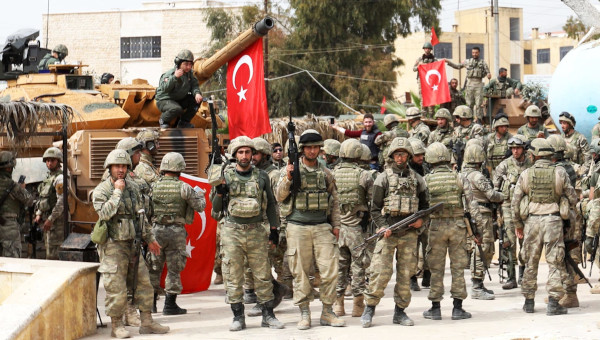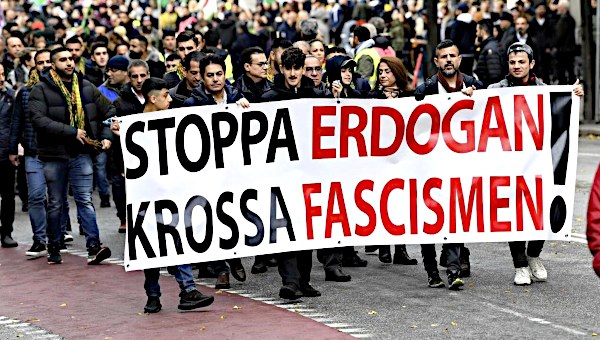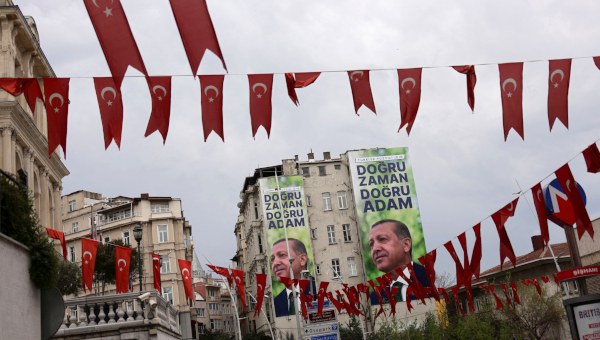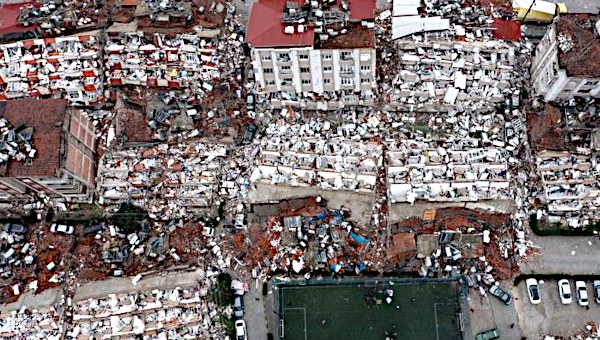The fate of the neoliberal Islamist project of authoritarian restoration in Turkey will be determined by an upcoming referendum on April 16 of this year. The referendum will be held under the conditions of a state of emergency in effect since the July 15 coup attempt last year. The regime’s use of the putsch attempt to suppress all forms of dissent has quickly evolved into an overriding choice to make the state of emergency the permanent form of governance in Turkey. In this sense, the April 16 plebiscite on constitutional changes marks a defining stage in the politics of violent polarization and oppression under way for more than a decade whereby President Recep Tayyip Erdoğan and his cronies have increasingly paralyzed the social and political fabric of the country in their relentless pursuit of the project of a one-man rule.
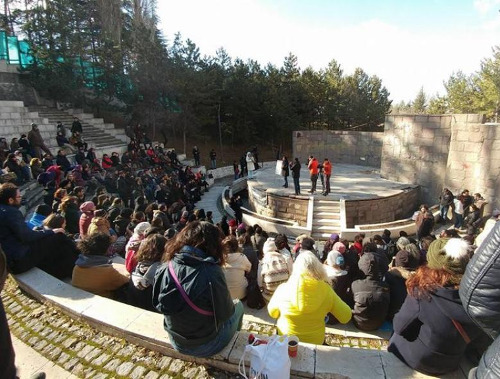
The question on the ballot is nothing less than a version of Führerprinzip, dubbed the “presidential system” in the managed and heavily censored mass media discourse in Turkey. A permanent Erdoğan presidency is offered as a panacea to the ruling classes to resolve the constitutional and economic gridlock of the neoliberal regime. However, as various polls are now signaling, the swaying of the public opinion toward #NO, the government is increasing the volume of suppression and making moves for a total closure of public deliberation about the real content of the regime change on the ballot. What is more (as vividly experienced in the recent crisis over the politics of the far right in Germany and the Netherlands), the ruling Justice and Development Party (Adalet ve Kalkınma Partisi, AKP) seems to be panicking about an upset in the referendum, and resorting once again to a vulgar politics of Turkish victimhood, this time vis-à-vis Europe.
The unfolding dynamics of political power and Erdoğan’s claim to majoritarian rule makes the freefall and panic of the regime all the more apparent. While there is a populist push to establish one-man rule through a politics of political oppression from above and mob rule from below, the widening mobilization of a spectrum of opposition groups is forcing the regime to govern through statutory decrees which bypass constitutional and parliamentary checks and balances altogether. This is a systematic, if not novel, resort to measures that attempt to cage the socio-political fabric of Turkish society into a pro-capital, repressive and radical conservative settlement. The mass dismissals from different branches of the public sector are not only directed against the alleged coup plotters, they are also used as the key means of purging progressive, left-wing, and secular cadres from the public institutions. The case of Academics for Peace is one of the most notable examples demonstrating the political motives of the purges and the ideological content of the restoration project being pursued by the AKP.
The Turkish State’s Encounter with a Demand for Peace
Despite the centre-left arguments about the AKP as an agent for democratization in Turkey in the mid-2000s, the party has always represented an aggressive coalition of neoliberal class rule. The AKP has continually waged a war of position – with much success – for restructuring the entire socio-political matrix within a particular fusion of neoliberal and Islamist political agendas.
In addition to the political demands of the labour and women’s movements, the issues pertaining to the political demands of the Kurdish people and regions constitute one of the central challenges to the AKP’s quest for complete political hegemony. Erdoğan’s abrupt decision to terminate an already fragile peace process between the government and Kurdish movement early in March 2015 was circumscribed by the conjunctural crisis produced by the AKP’s flawed foreign policy (particularly with respect to Syria) and the sudden rise of the Peoples’ Democratic Party (Halkların Demokratik Partisi, HDP) as a political project of both Kurdish and progressive social forces mobilized against the government. The electoral successes of the consecutive AKP governments came to a halt when the HDP received 13 per cent of the votes in the June 2015 elections, ending the AKP’s parliamentary majority. At the same time, the ongoing war of the state security forces against the Kurdish population accelerated with the ascendency of Kurdish liberation movement in neighbouring Northern Syria. Erdoğan resorted to ultranationalist rhetoric to regain an AKP majority in the parliament in the snap elections of November 2015.
As the UN Human Rights Office report just published documents, state security forces committed massive destruction, killings and other human rights violations in the Kurdish provinces between July 2015 and December 2016. The satellite imagery analysis indicating the scale of the destruction is particularly alarming. As documented in the latest UN report and an earlier Amnesty International report, men, women and children were trapped for weeks in basements without water, food, medical attention and power before being killed by fire, induced by shelling. An estimated 355,000 to 500,000 Kurdish civilians were forcibly displaced. In the meantime, the civil society organizations and activist groups in the western part of the country that dared to show support and solidarity with the oppressed Kurdish population were silenced.
In this context of a humanitarian crisis, Academics for Peace – a civil rights group comprising academics with Turkish citizenship – issued a declaration, entitled “We will not be a party to this crime,” calling on the government to resume the peace process and stop the atrocities conducted by the state security forces toward civilians in the Kurdish provinces. The peace declaration was released to the press on January 11, 2016 with 1,128 signatures, mostly from academics residing in Turkey.
Immediately following the academics’ press release, Erdoğan launched an intense campaign of intimidation toward the signatories and marked the academics as ‘traitors,’ accusing them of supporting terrorism. Yet, despite the defamation and harassment of the signatories, the declaration received over 1,000 additional signatures; by the end of January 2016 it was signed by a total of 2,212 academics, most residing in Turkey. Since then, the Turkish (and some others) signatories have faced rights violations with an extraordinary range and degree of repression, including disciplinary investigations, police interrogations, detentions and imprisonment, threats, mobbing, intimidation, bans on leaving the country, dismissals, suspensions from duty, and cuts to their research funding. With the latest waves of statutory decrees under the state of emergency, mass dismissals from public universities, travel bans and bans on conducting any kind of public duty came into effect. It is unlikely that the dismissed Turkish academics will find employment in the private sector either as the state labeled them supporters of terrorism. Academics of Turkish nationality who subsequently found positions at overseas universities were not permitted to leave Turkey; and those already abroad when dismissal decrees were issued remained stranded as the government restricted consular access. (For an updated list, see “Rights Violations Against Academics for Peace.”)
Turkey has never been a haven for either freedom of speech in general or academic freedoms. The political history of modern Turkey is a history of military coup d’états, curfews, states of emergency, and purges toward oppositional forces. Although the purges from the universities conducted under the AKP government are the largest in sheer numbers, they are neither new in form nor content. In his comments to the press on February 7, 2017 following the dismissal of 330 academics by a statutory decree issued by the Turkish state, the renowned Marxist economist Dr. Korkut Boratav articulated this long history of persecutions: “In 1948 my father had been sacked from the university, in 1980 I was, and today my assistant is sacked.”
The escalating scale and increasing frequency of government decrees since July 2016 point toward an unprecedented stage in the AKP’s political intentions to redesign state-society relations along its unique blend of neoliberalism and Islamism under one-man rule. Following the near total silencing oppositional press through the jailing of journalists and harassment of publishers, the academic crackdown portends an authoritarian move to eliminate one of the last bulwarks of independent and critical thought in Turkey.
Building Solidarity and Resistance among Academics
The political and historical significance of Academics for Peace’s declaration lies in the expression of truth it articulates within a political moment dominated by the systematic exercise of state violence against the civilian population and the absence of media coverage of human rights violations under heavy government suppression. Despite the public targeting by the state, criminal prosecutions and disciplinary investigations, dismissals and massive purges, the Erdoğan regime has failed in its efforts to coerce academics from withdrawing their commitments to the peace declaration in any meaningful numbers. Despite a hostile political environment for dissent and a normalization of state violence, the Academics for Peace initiative is being taken up by other progressive organizations. The politics of building solidarity by standing up for truth is being embraced by wider segments of society. In the months following the peace declaration, a large number of groups comprising university students, artists, writers, film directors, musicians, and lawyers, have publicly declared their support for Academics for Peace and embraced the discourse of the petition, and stood up to similar kinds of oppression.
The mass purges since the July 15th coup attempt have intensified state oppression, but they have also precipitated solidarity-building efforts by alternative means. The solidarity networks established both within and outside Turkey have expanded the public condemnation of the state’s crimes against the civilian population. Many international human rights and academic organizations have expressed their support for the Academics for Peace, and called for an end to the ongoing state violence and human rights violations. Various efforts are under way to establish financial solidarity mechanisms among the purged academics with the active participation of left-wing, progressive union, Education and Science Workers’ Union (EGITIM SEN) and a number of other national and international organizations like Education International. The international academic networks such as Scholars at Risk (SAR), Scholars Rescue Fund (SRF) and Council of at Risk Academics (CARA) have been significant in enhancing solidarity with the threatened academics. It is important to note that these solidarity networks are accompanied by alternative organization and practice of collective processes of scientific production. The examples of Solidarity Academies, Street Academy and Course Cooperatives, have been growing in number. They have been encouraging the seeds for critical scientific inquiry as a collective and transforming practice.
The experience of the Academics for Peace is located in Turkey, but it is also reflective of rights violations over freedoms of expression, of academic enquiry and assembly that are not restricted to Turkey. The democratic rights and freedoms we inherit from previous generations of political struggles of working class people and progressive forces in the history of modern capitalism can never be taken for granted. The struggles for our rights and freedoms have to be perpetual as the capital accumulation with its imperialist tendencies depends on the violations of such rights and freedoms. The current crisis of capitalism continues to generate ever more forceful impositions of neoliberalism, and a proliferation of authoritarian tendencies and regimes. Democratic rights and freedoms are amongst the first to be sacrificed, and we are now engaged in a perpetual struggle to defend them. •
International Solidarity with the Academics for Peace
There is a lot that can be done to extend international solidarity to Turkish academics facing mass and arbitrary dismissal by the authoritarian regime in Turkey. Here are some suggestions:
- Contribute to the solidarity funds: Research Institute on Turkey, Bostonbul, GIT North America and concerned academics in Canada and the U.S. have launched an international campaign to promote solidarity with the Academics for Peace in Turkey. Organized in cooperation with the Education and Science Workers’ Union (EGITIM SEN) in Turkey, the campaign calls for financial support: youcaring.com/dismissedafpturkey. CUPE 4600 in coordination with the Education and Science Workers’ Union (EGITIM SEN) in Turkey invites you to contribute to the international solidarity with the Academics for Peace.
- Investigate whether your institution can temporarily host or hire an academic currently at risk in Turkey.
- Explore whether your department can prioritize the transfer of graduate students currently at risk in Turkey in their admission processes and find alternative arrangements for funding such as waiving international tuition fees.
- Check whether your institution is a member of the Scholars at Risk Network. SAR Network Canada Section is quite new. Only 15 Canadian Universities are involved. If your institution is not one of them, organize your colleagues to join the network.
- Scholars Rescue Fund is another third party organization which helps at risk scholars around the globe. Consider becoming a host partner by only providing with matching support.
- Consider possibilities of conducting joint research projects, applying for collaborative research grants with at risk academics and graduate students in Turkey in order to resist state-targeted isolation of academic production in Turkey.
- Invite at risk Turkish scholars to give keynote speeches in your conferences, invite them to submit articles for your journals, blogs, web pages, or contribute to their journals, blogs, or conferences to expand collaboration.
- Use every opportunity to disseminate knowledge about the plight of academics in Turkey. This could involve organizing talks, exhibitions, and press conferences, or producing films and publications.
- Organize and participate in political actions and lobbying campaigns directed at Turkish officials and/or officials in your own government. Turkish embassies and consulates have been taking pro-active measures for some time now to get involved in the academic initiatives at the universities abroad. It is particularly important to urge university administrations not to be a party to the Turkish state’s crime toward academics through inviting them to academic seminars, opening ceremonies and such.
- Here is an article listing seven more ways to support academics in Turkey drafted by Chad Kautzer, Associate Professor of Philosophy at Lehigh University. •
Thanks to Mete Pamir for his thorough editing and insightful comments on the themes for this essay.


